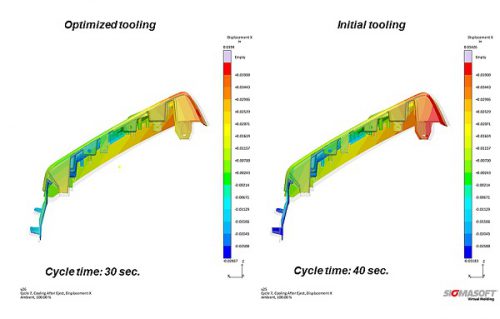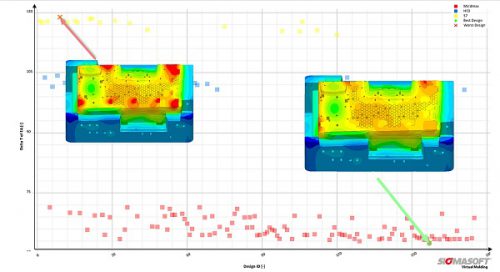The reduction of cycle time is an essential condition in every injection molding operation. At the same time, it is important to deliver the required part quality in terms of dimensional stability.
SIGMASOFT® Virtual Molding with its Autonomous Optimization technology allows comparing multiple scenarios in terms of cooling placement and mold material, to achieve both conditions at the minimum cost per part.

Figure 1 – With the Autonomous Optimization technology available in SIGMASOFT® Virtual Molding, it was possible to find the minimum possible cycle time for an application, while at the same time improving dimensional stability. The part deformation vs. the initial design (transparent) are depicted.
Improving Part Deformation and Cycle Time with Virtual Molding
Aachen- The reduction of cycle time is crucial in every injection molding operation. At the same time, it is important to deliver the required part quality in terms of dimensional stability. While many molding operations tend to extend the cooling time inside the mold to achieve the minimum possible part deformation, a proper selection of mold materials and placement of cooling lines can help to dramatically reduce cycle time while at the same time delivering the expected dimensional behavior of the part.
A component for an automotive application was being molded with a cycle time longer than expected; a circumstance that heavily compromised the profitability of the molding operation. In this case, it was seen that the part had several hotspots after molding, and whenever the cooling time was reduced, the part distortion reached unacceptable limits.
To avoid the hotspots, the molder identified two possible solutions: improving the placement of cooling lines and introducing highly conductive alloys at some specific locations in the mold. However, this tooling modification came at a heavy price, and it was important to acknowledge upfront the best possible configuration, and to assess the economic benefit of the modification.
With SIGMASOFT® Virtual Molding, a virtual DoE – included in the Autonomous Optimization technology – was started. In the example, two targets were pursued simultaneously: reducing molding cycle time while at the same time keeping low tooling costs. To achieve them, the cooling lines were modified through several iterations, and the material of specific inserts was changed.
“The iteration process took in total about 176 designs, completed in about 50 hours”, explained Gabriel Geyne, SIGMASOFT® Virtual Molding engineer in charge of the project. “However, from these only 3 hours were actual engineering labor and the rest was computer calculation time. After this, the optimal mold design was found.”
The exploration of all possible conditions allowed a cycle time reduction from 40 to 30 seconds. While the inserts were more expensive, all in all the molding process reduced costs by $48.930 over 250.000 molded parts.
SIGMA (www.sigmasoft.de) is sister company to MAGMA (www.magmasoft.de), the world market leader in casting process simulation technology based in Aachen, Germany. Our SIGMASOFT® Virtual Molding technology optimizes the manufacturing process for injection molded plastic components. SIGMASOFT® Virtual Molding combines the 3D geometry of the parts and runners with the complete mold assembly and temperature control system and incorporates the actual production process to develop a turnkey injection mold with an optimized process.
At SIGMA and MAGMA, our goal is to help our customers achieve required part quality during the first trial. The two product lines – injection molded polymers and metal castings – share the same 3D simulation technologies focused on the simultaneous optimization of design and process. SIGMASOFT® Virtual Molding thus includes a variety of process-specific models and 3D simulation methods developed, validated and constantly improved for over 25 years. A process-driven simulation tool, SIGMASOFT® Virtual Molding provides a tremendous benefit to production facilities. Imagine your business when every mold you build produces required quality the first time, every time. That is our goal. This technology cannot be compared to any other simulation approach employed in plastics injection molding.
New product success requires a different communication between designs, materials, and processes that design simulation is not meant for. SIGMASOFT® Virtual Molding provides this communication. SIGMA support engineers, with 450 years of combined technical education and practical experience, can support your engineering goals with applications specific solutions. SIGMA offers direct sales, engineering, training, implementation, and support, by plastics engineers worldwide.
Figure 2 – The image shows the best and the worst configuration from the thermal point of view. The Y axis indicates how big the thermal gradient within the mold is. The color ranges indicate the different insert materials.

Figure 2 – The image shows the best and the worst configuration from the thermal point of view. The Y axis indicates how big the thermal gradient within the mold is. The color ranges indicate the different insert materials.












